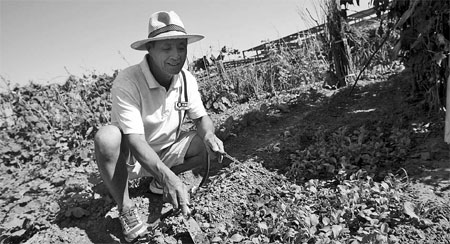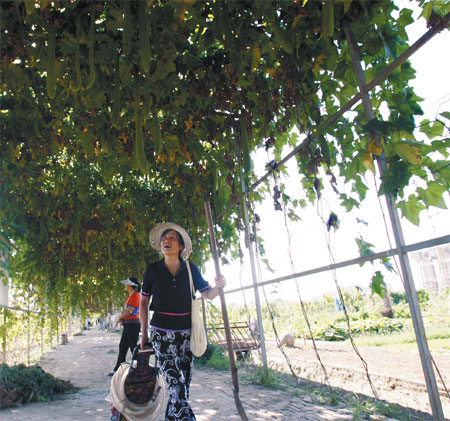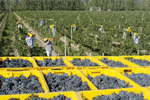Weekend farmers
Updated: 2012-09-03 09:51
By Liu Zhihua (China Daily)
|
||||||||
 |
|
Zhang Hongwei, newly retired, has found new purpose cultivating his plot in a southern suburb of Beijing. Zhang Wei / China Daily |
Online gardening games such as Farmville gave the IT generation the instant gratification of harvesting fruits and vegetables. Now, many are escaping to the great outdoors on weekends, exchanging keyboards and styluses for hoes and hoses. Liu Zhihua finds out why they've gone back to the land for comfort.
The farm on the outskirts of Beijing is large, spread over more than 9,000 square meters and divided into 1,360 allotments. All the plots have been rented out to weekend farmers, and there are still 100 more applicants on the waiting list.
Yifendi Farm, a cooperative run by Nanyuan Village in Beijing's Fengtai district, is one of the largest allotment farms in the Chinese capital, and it claims to be the first.
"Farming in the real world is more engaging than playing online," says Chen Jiansheng, head of the village, and the main motivator.
"People from the city love farming. We had tenants as soon as we started offering the plots, without any promotion or advertisement."
When Zhang Hongwei chanced upon the Yifendi Farm project in early March, he immediately decided to rent an allotment of 66 square meters, at a cost of 1,200 yuan ($189) a year.
The 63-year-old had been bored since his retirement at that time, and was looking for productive recreation.
Now he is in his allotment every other day, and very happy. He is pleasantly surprised by his rewards: His family doesn't need to buy vegetables from the market any more, because since April, he has been taking home all kinds of produce.
He even has extra for friends and neighbors.
"I didn't expect such a good harvest," Zhang says. "Working at the farm is a kind of exercise for me in the first place. It is more interesting than just working out at sports facilities."
The farm provides not just seeds, organic fertilizers and gardening tools, but also technical support from 15 technicians, with whom Zhang has already made friends.
"Farming brings color to my life," Zhang says. "It feels great when families and relatives thank me for the vegetables I bring them."
Yifendi Farm says most of their allotment tenants are not retirees like Zhang, but young, busy white-collar workers in their 30s and 40s.
Zhang Jie, 40, says he wants to continue farming as long as the farm operates. The telecommunications engineer with a major State-owned enterprise drives 30 minutes every weekend to cultivate the family's two allotments in Yifendi Farm.
"My job requires time and energy. But no matter how madly busy I am, I manage to spend at least one day during the weekends on the plants," Zhang says.
"It is all for my daughter. I want to let her eat safe and delicious vegetables."
When his daughter, now nearly 6, started eating solid food, Zhang became very concerned. He felt that the vegetables sold in supermarkets were no longer of the same quality as those he ate as a child. There were also too many food safety scares.












